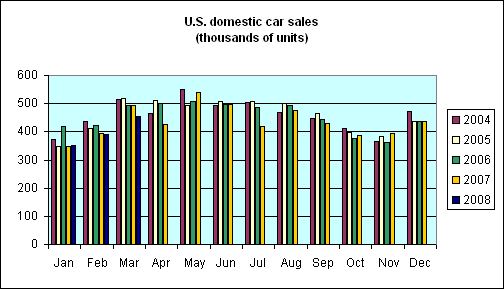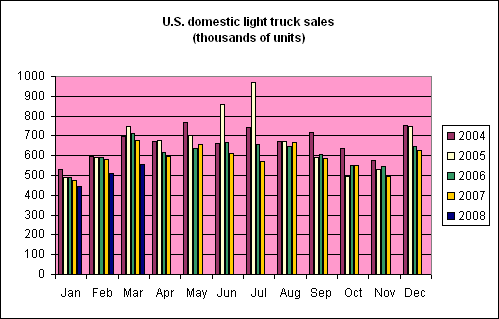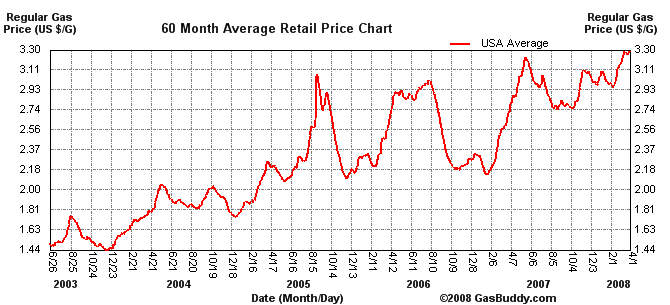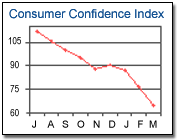Automobile sales do not bode well for first-quarter GDP.
U.S. sales of cars manufactured in North America rose 16% between February and March. However, that’s a substantially smaller increase than we’d expect to see this time of year. Sales were down 7.7% compared with March 2007, and that represents a clear acceleration of the steady downward trend we’ve seen over the last five years. The graph below records the sales for each month over the last 5 years so that you can simultaneously see both the seasonals and trends. To make year-over-year comparisons, look across the adjacent columns for any given month.
 |
But the really dramatic deterioration showed up in sales of light trucks, which includes the increasingly less trendy sport-utility vehicles. March sales of domestically manufactured light trucks were down 18.3% relative to March 2007.
 |
Similar patterns were seen in U.S. sales of imported cars and light trucks, with March marking an important milestone: the 668 thousand total U.S. sales of light trucks (imported plus domestic) was less than the 684 thousand cars sold. Meanwhile, sales of the gas-stingy Prius continued to set a new record.
 |
 |
One factor in the plunging SUV sales is doubtless the record price of gasoline. But even more important is the fact that consumer worries about income and job security are leaving them no longer willing to ignore those prices. And falling consumer confidence means that autos are not going to be our only problem.
 |
Technorati Tags: macroeconomics,
autos,
auto+sales,
economics,
recession,
oil prices,
gas prices,
oil shocks
Yep, the auto sales numbers are ugly. Surprising to me was how weak Toyota and Honda sales were.
Ugly downturn underway and accelerating: falling employment, falling consumption, unsupportable household debt, higher credit standards, and return of the risk premium. No wonder folks are getting morose.
Should be an interesting spring, summer, and fall.
Is anyone surprised that congress has a deaf ear to this news. They continue to attack the auto industry, they impose new regulations pushing up the cost of new vehicles. Will congress ever get a clue and stop attacking US corporations.
I mean they just attacked the oil producers for their profits and totally failed to recognize that the government gets almost a 50-50 split on those profits. Does anyone with a brain actually believe that congress wants the oil companies to report less profit meaning less tax receipts? Then they would be crying about lost federal revenue and they would use that to increase taxes even more. What a disaster!
Gee, gas prices up, economy slowing, personal debt up, and home prices falling.. what a surprise! I bet there are great deals to be had on Hummer H-2s.
What new regulations? In your head?
The reason auto sales are falling is completely cylical and not unneeded. Grow up Dick.
Oops, sorry Detroit!
Tack on a 0.3% or so GDP drag from the American Axle strike (which just spread to two more GM plants) and the auto sector is going to be a substantial drag on Q1 growth. Chairman Ben says growth will return in the summer, but if there is an inventory problem (not for GM, maybe for others), we might have to wait a bit beyond summer.
Jim-
The consumer sentiment graph really shows how the MSM strive to make things look worse during Republican administrations. Even though the economy was good a few years into Reagan, and on the upswing after early 2003 during Bush, consumer sentiment was declining. Contrast that to the wonderful Clinton years, where it was onwards and upwards. Just shows what hewing to a relentless propaganda line will do.
DickF asks, “Does anyone with a brain actually believe that congress wants the oil companies to report less profit meaning less tax receipts?”
Congress would be delighted to see consumers reporting higher amounts of spendable income, which is the means by which companies other than oil companies get their profits. Particularly since oil companies seem to be especially gifted at tax evasion.
For that matter, consumers and companies other than oil companies would also be delighted.
That leaves oil companies as the only ones who would not be delighted to be making larger profits.
Profit margins for one sector does not equal tax receipts. This is basic economics.
Rich,
Clinton was one of the most supply side oriented presidents we have ever had. Note the following recap of the Clinton years sent to me by a friend [Clinton]… reduced capital gains from Reagan’s compromised level of the high 20’s down to 20% and a reform of real estate capital gains to make the gain on personal residence essentially tax free for most sellers…resulting in a real estate building boom which we know about very well today. At the same time Clinton proceeded to sign the Nafta Agreement and was generally a champion of reducing taxes on trade…a supply side policy….. At the same time Clinton also oversaw the deregulation of the telecom industry which reduced drag on production of telecom, broadband and all related computing and communication, media businesses. This deregulation was a reduction on production drag and so also a supply side policy. In addition the defeat of Clinton’s health care scheme avoided the drag on our pharmaceutical and medical based economic sector. All in all, Clinton was as much of a supply sider as Reagan was…no matter how reluctantly he arrived there with the tugging of a Republican Congress…and he came on the back to Bush I who raised taxes, dealing with the S&L crises in a ham-handed big government way and increasing spending. It was Clinton who brought the Reagan revolution into a more mature implementation and further reduction in tax on capital…not Bush I.
Rich: Are we looking at the same graph? Consumer sentiment rises under one Democrat and falls under one; and it rises under one Republican and falls under two. That’s hardly a distinct enough trend to base a theory on, especially considering how many other factors besides media go into creating consumer sentiment.
DickF, I think you’re missing how pro-business Clinton really was: socialization of healthcare would have taken that expense away from business.
Hmmm. Methinks this — “…the MSM strive to make things look worse during Republican administrations.” — is a “…relentless propaganda line…”
cactus over at Angry Bear has done a pretty thorough job of showing that in most ways that matter to the average Joe, the economy performs better under Democrats than Republicans. That might explain why the public mood turns sour under Republicans, despite the “relentless propoganda line” that Republicans are better economic managers.
The seasonally adjusted annual sales rate for autos was:
jan….15.332
feb….15.378
mar….15.113
This gives a -20.0% IVth quarter to Ist quarter growth rate.
DickF, if Congress had done this job with CAFE ten years ago, Detroit might have some competitive vehicles to sell today (they would have been forced, but they would have them). They fought kicking and screaming against the idea that small car buyers might actually want to stay with small cars — and look where it got them.
Also an interesting development today, as a big financier of Delphi backs off, which is bad news for GM.
http://biz.yahoo.com/ap/080404/delphi_bankruptcy.html
Consumer sentiment has been steadily downward in this country for the last four years, and news of 80,000 fewer jobs (147,000 if you count Jan and Feb. revisions) can’t be good news going forward. And with banks continuing to write down and JPM Chase yanking job offers to new grads, don’t expect this to improve any time soon, regardless of that $600-$1,200 you’ll be getting in a month.
DickF, if Congress had done this job with CAFE ten years ago, Detroit might have some competitive vehicles to sell today
They also could have very well gone out of business.
Detroit has made a lot of money off SUVs over the last 15 years. Don’t forget that oil traded at $10 a barrel as little as 10 years ago.
How much better off in cars could they be? I look at their car models, and I see a lot of new stuff (Fusion, Malibu, Sebring, etc.)
Detroit has decent small models (Caliber, Cobalt, Focus).
The problem is not that they don’t have the models to compete, the problem is that they can’t make the profits that they need to make by selling Cobalts.
Maybe that changes in the future with the deals they’ve made with the UAW and with the fall in the dollar. Who knows.
Also, think about this: Detroit has European arms that already make models that get much, much better mileage than what they sell in America.
Can Detroit bring those models over here fast enough to make a difference in sales?
GM has already turned it’s Saturn brand into little more than a marketing operation for its European makes Opel and Vauxhaul. The Saturn Astra is literally a rebadged Opel. It’s even made in Belgium!
The Saturn Aura is not as close a copy of the Opel Vectra, but it is 90% the same.
The real key might be getting the diesels that Detroit offers in Europe over here. But at $4 a gallon, is anybody all that interested in diesels, even if they get 40% better mileage?
Buzzcut, GM and Chrysler’s small cars are still more punishment than product – the Focus is OK, but not good enough to overcome its parent. Most of us get to rent these vehicles on business trips and are well aware of how far GM et al really have come (and haven’t).